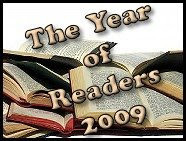There seems to be a lot of talk going around about the death of reading, or of the book. I even have a book on my shelf about the future, or lack thereof, of books.
Of course, that book is itself now so old as to be laughably out of date. It never even had a chance to gloat at the creation of the Kindle, or frown contritely at the overall lack of reaction the Kindle garnered.
Reading isn't dead, and I don't think it ever will be. The internet is largely a written media, and is hugely successful. If looked at that way, more people are reading now than ever before. Of course, the problem is that they're not reading what the bloviators want them to. This is always the problem. You can find an article from almost anytime and find out that reading is in some form of danger, right up until you get to Plato, when the worry is rather that reading is endangering memory. Of course, no one remembers that, since as readers we can't remember anything.
It's currently being focused on for a couple of reasons. One, newspapers are dying. Since they know people aren't reading them, they now worry about reading. The other is that there does seem to be a decrease in the size of the literary fiction market. There's also the decrease in the literary fiction market, which is leading to some literary fiction authors talking about the increasing illiteracy of our society.
Looking at the numbers, they seem to be right. Literacy is decreasing, and flaws in our education system likely deserve a part of that blame. Of course, it doesn't help that readers of specific types of writing look down on each other.
Nonfiction fans look down on fiction fans, lit fiction fans look down on those who read anything else, romance fans are often just embarrassed. And then there are fans of science fiction and fantasy, who rightly or wrongly, often feel isolated and looked down upon. This is one of the richest literate societies we have, but they feel alienated. The works they love, be they Grand Masters, like Asimov and Clarke, or space opera like Bujold, are often seen as less in some way, than the books which appear on the general fiction shelf. Kurt Vonnegut stands as the shining example that, if an SF author earns enough attention, they don't bring prestige to the genre, rather, they get to leave the SF ghetto, and enter the regular fiction section in the bookstore.
So is it a quality judgement? It often seems to be. I'm the first to say that there is a lot of terrible SF out there. I mean really terrible, execrable. But there are a lot of really terrible books on the regular fiction shelves, too. Frankly, it's about even.
There's an easy way we should look at it. Don't look down on what people read, let them read it. You might get them hooked on reading, then, when they're hooked, you can get them hooked on the hard stuff.
Be careful about getting them on the hard stuff though, you have to do it right. It was done wrong for me once. I had an English teacher I really liked and admired in Junior High, and at graduation, he gave everyone a graduation gift. I got Moby Dick. I didn't want it. Inside he had written to me that he hoped that I would enjoy this tale of great adventures on the high seas. My alienated early teen alarm went off like a gong. I'd seen the same after school specials he'd seen.
The nerdy kid, who reads comic books, or SF, or something similar, and then his wise teacher gave him a copy of Moby Dick, the great American novel. It changed his life, the kid read that, and it changed his life. His glasses morphed into cool glasses, his spider man t-shirt into a polo shirt, and his voice deepened. He also started reading Kerouac and Hemingway. He always thought so fondly about the teacher who had changed his life.
I put the book on the shelf when I got home. It's still on the shelf in my parents house now. I may read it one day, I may not. Now I really liked this teacher, and I still do. I know he meant well, but it didn't work. And I'm a reader, these days I read about as much literary fiction as anything else. This same teacher also shares the credit for my current fondness for literature. He taught me Homer, and Shakespeare, two authors for whom I have a life-long affection. He taught the Odyssey superbly, complete with his own hand-made charts of the inter-relationships of all of the different figures in Greek myth.
Everyone comes out of high school with a list of authors whom they hate. They may never have even read them, but they know they don't like them. I think the attitude of looking down on the books that people enjoy fosters this. There's plenty to enjoy across the broad spectrum of books. Let them read what they enjoy, teach them to enjoy reading first, then expose them to books across the spectrum to broaden their tastes. If they don't enjoy reading then, when you give them the 'great' books to read, they won't enjoy them.
With that said, I'm curious. What authors did you come out of school with a strong aversion to?
Tuesday, April 15, 2008
Subscribe to:
Post Comments (Atom)

No comments:
Post a Comment